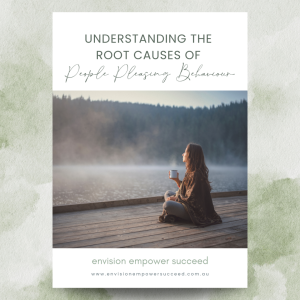In our interactions with others, it’s natural to want to be helpful and kind. Many of us embrace the role of a giver, finding joy in supporting and uplifting those around us. However, it’s important to distinguish between being a genuine giver and falling into the trap of being a people pleaser. While both may involve acts of kindness, the motivations and outcomes can be vastly different. We will be exploring the characteristics of a giver and a people pleaser, highlighting the importance of setting boundaries and embracing a healthy balance in our relationships.
The Motivation Behind Actions:
A giver acts out of genuine care and empathy, deriving satisfaction from helping others. Their actions come from a place of selflessness, with the primary intention of making a positive impact. On the other hand, a people pleaser’s actions stem from a fear of rejection or a desire for external validation. Their motivation is driven by the need for approval, often sacrificing their own well-being in the process.
Establishing Healthy Boundaries:
A giver understands the importance of setting boundaries to maintain their own wellbeing. They recognize that self-care is vital for sustaining their ability to give. Givers prioritise their own needs and ensure they are met before extending support to others. In contrast, people pleasers struggle with boundary-setting. They often find themselves overwhelmed and depleted, constantly saying yes to requests even at the expense of their own wellbeing.
Authenticity in Relationships:
Givers foster authentic and balanced relationships. They express their needs, opinions, and boundaries openly, allowing for genuine connections. Givers embrace vulnerability and understand that healthy relationships involve give-and-take dynamics. People pleasers, however, tend to suppress their true selves. They fear conflict or rejection, often moulding themselves to meet the expectations of others, which can lead to a lack of authenticity in their relationships.
Emotional Wellbeing:
Givers maintain a healthy sense of self-worth and self-esteem. They understand that their value is not solely dependent on meeting the needs of others. Givers prioritize their own emotional wellbeing and seek support when needed. People pleasers, on the other hand, struggle with self-worth and often experience emotional exhaustion. Their happiness is contingent upon the approval and acceptance of others, leaving them vulnerable to feelings of resentment and disappointment.
Empowerment and Empathy:
Givers empower others by encouraging their growth and supporting their autonomy. They inspire and uplift, fostering a sense of empowerment in those they interact with. Givers also possess empathy, understanding the importance of acknowledging and validating the emotions of others. People pleasers, however, tend to enable dependency by constantly fulfilling the wishes of others. They may inadvertently hinder personal growth and independence.
While being a giver is a beautiful quality, it’s essential to differentiate between genuine giving and people-pleasing behaviours. Establishing healthy boundaries, valuing one’s own wellbeing, nurturing authentic relationships, and empowering others are key aspects of being a giver. By recognizing the pitfalls of people-pleasing, we can shift towards a more balanced and fulfilling approach in our interactions. Remember, self-care and authenticity are vital in maintaining healthy relationships and personal well-being. Embrace your role as a giver while honouring your own needs, and watch as your impact positively transforms both your life and the lives of those around you.







